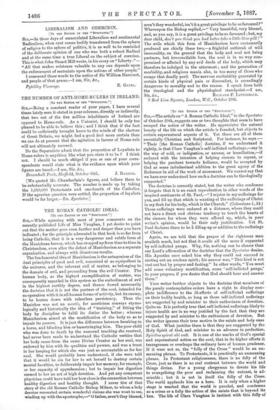THE ROMAN CATHOLIC IDEAL.
rT. TRE EDITOR Or THE "SPECTATOR."] Stn,—While agreeing with most of your comments on the recently published Life of Miss Vaughan, I yet desire to point out that the matter goes even farther and deeper than you have indicated ; for the principle advocated in that book is so far from being Catholic, that it is a very dangerous and subtle form of the Manichean heresy, which has cropped up from time to time in Christendom, even after the defeat of Manicheeism as a separate organisation, and always with disastrous results.
The fundamental idea of Manicheeism is the antagonism of the dual principles of good and evil, conceived of as equipollent in the universe, and the inherent evil of matter, as belonging to the domain of evil, and proceeding from the evil Creator. The human body, as the highest exemplification of matter, was consequently regarded in this system as the embodiment of evil in the highest earthly degree, and thence flowed necessarily the doctrine that it is not the partner of the soul, intended for co-operation with it in all human forms of activity, but its enemy, to be beaten down with relentless persistency. Thus the Manichee was not an ascetic, for asceticism conveys etymo- logically and historically the idea of " training," of fitting the body by discipline to fulfil its duties the better ; whereas Manicheeism aimed at the mortification of the body so as to impair its powers. It is just the difference between breaking-in a horse, and blinding him or hamstringing him. The poor child who was done to death by the unsound teaching she received, bad never been made to understand the Catholic verities that her body came from the same Divine Creator as her soul, was endowed by him with its qualities and powers, and was a trust in her keeping for which she was just as accountable as for her soul. She would probably have understood, if she were told that it would be sin for her to set herself to destroy certain mental faculties, to deliberately impair her memory, for example, or her capacity of apprehension ; but to impair her digestion seemed to her an act of high devotion. And yet any competent physician could have told her how close is the connection between healthy digestion and healthy thought. I never tire of that story of the old Roman Catholic Bishop Milner, to whom a lady devotee recounted certain wonderful visions she was wont to see, winding up with the apostrophe,—" 0 father, aren't they blessed,
aren't they wonderful, isn't it a great privilege to be so favoured?" Whereupon the Bishop replied,—" Very beautiful, very blessed, and, as you say, it is a great privilege to be so favoured ; but, my dear child, don't you think you had better take a little blue-pill ?" The evils which this form of Manicheeism have customarily produced are chiefly these two,—a frightful outbreak of wild immorality, on the ground that the body and soul not being partners, but irreconcilable foes, the soul is in no way com- promised or affected by any evil deeds of the body, which may therefore be indulged to the uttermost ; and the generation of morbidity, and religious mania also, in too many of those who escape that deadly peril. The nervous excitability generated by certain kinds of physical pain or discomfort, is exceedingly dangerous to morality and to the reason. I speak from both the theological and the physiological standpoint. —I am,


















































 Previous page
Previous page